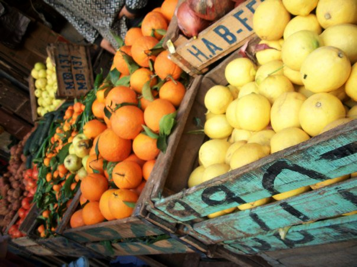Exploring Moroccan-American Foodways
by M. Ruth Dike
Moving to a new country can have a profound impact on the way people think about themselves, their home country, and their culture. The immigrant experience is often associated with a push and pull between the new culture and the traditional culture of their homeland. For Professor Carole Couniahn’s Anthropology of Food and Food Ethnography (ML 641 & 642) classes, I completed an ethnographic study exploring the evolution of Moroccan American identity through food in Boston.
Ever since I studied abroad in Morocco and completed my Honors Thesis on Moroccan foodways, I have yearned for Moroccan cuisine and hospitality. Fortunately, I have discovered both these things in Boston and have been warmly embraced by the Moroccan American community here. Last semester, I interviewed 10 Bostonian Moroccan Americans and conducted over 10 hours of participant observation in a variety of restaurants, markets, as well as a Moroccan bakery.
I was happily surprised to find that the Moroccan population in Boston is large and growing. My research chiefly explores how and why Moroccan foodways are changing in the American context. I will briefly explain one of the challenges that Moroccan Americans may experience when attempting to cook Moroccan cuisine in Boston.
Although most of my informants reported that few or no ingredients were unavailable in Boston, a different answer emerged when I showed individuals this picture of snail soup. My informants talked about missing the soup, which is said to be beneficial to one’s health, but explained that it was impossible to find the live snails required to prepare this dish.

Moroccan Americans procure ethnic food items in a variety of different ways including ethnic food markets, larger supermarkets, direct shipments from home, and visiting their home country directly. One of my informants who has lived in Boston for over 20 years said that when he immigrated, the only Halal* food markets were at Haymarket. Today, more than eleven Halal markets are spread throughout the greater Boston area (Ethnic Food Markets 2012).
But even if a someone is able to get Moroccan ingredients, it is difficult to recreate dishes in exactly the same way. Fresh fruits and vegetables taste differently in America, according to Fatima,** a 27 year-old who just moved to Boston about a year ago. She explained that many varieties of produce are available in America but the quality and taste varies. “The squash, there is less flavor to it here…The tangerines…they’re less sweet…I used to love tangerines in Morocco…Apples look different [in Morocco]…they’re not bright [and] shiny.”

Indeed, Morocco has an excellent growing climate and nearly all produce is organic. As a result, most Moroccans are accustomed to flavorful, organic produce that is harvested daily from local farms and sold fresh in open air markets. While American consumers generally place more emphasis on uniform, blemish-free, and longer lasting produce, Moroccan consumers are concerned primarily with taste. Quality, organic produce can be found in many Boston grocery stores and farmer’s markets, but the premium price can be prohibitive for some Moroccan shoppers.
This is one example of how food acts as a lens through which to study the Moroccan immigrant population in Boston. Ethnic cuisines are of paramount importance to many immigrant populations and provide a sense of home and cohesiveness in a new environment. Conversely, cooking and eating American foods can help immigrants affirm their new identity as Americans. The resulting hybridization of Moroccan and American food ways reflects the dual identity Moroccan Americans in Boston.
I would like to thank Dr. Carole Counihan for her guidance in this paper, the Moroccan American Bostonian community at large, and all of my participants, without whom this project would have been impossible.
* A religious term used for Islam’s dietary restrictions governing what one should and should not eat and how meat is butchered, similar to the kosher classification in Judaism.
**The names of participants have been changed.
M. Ruth Dike is excited to begin her second semester at Boston University’s Gastronomy program on Wednesday. To learn more about her research, contact Ruth at mruthdike@gmail.com